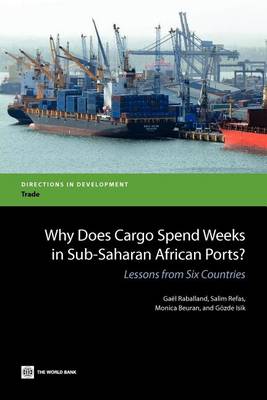Directions in Development: Trade
3 total works
The Cost of Being Landlocked: Logistics Costs and Supply Chain Reliability
by Jean Francois Arvis, Jean-Francois Marteau, and Gael Raballand
Published 7 July 2010
Why Does Cargo Spend Weeks in Sub-Saharan African Ports?
by Gael Raballand and Salim Refas
Published 30 April 2012
This book argues that long dwell time in Sub-Saharan African (SSA) ports is not exclusively the responsibility of customs as usually believed. The private sector (terminal operator, customs broker, owner of container depots, and even importers) has not necessarily an interest in reducing time spent in ports. The solution to decrease dwell time in these ports relies mainly on the challenging task of breaking the private sector's collusion and equilibrium between public authorities, logistics operators, and some importers. This book was written in the context of increasing investment by the international community in projects that promote trade facilitation and improvement in logistics in the developing world, including in ports, mainly based on the assumption that in ports, customs (and other controlling agencies) have to be mainly blamed for abnormal delays. However, customs responsibility (especially for months-long delays) may not be as important as usually believed and therefore requires in-depth data collection and analysis which has been lacking so far. The authors disentangle cargo delays in ports with comprehensive data collection in six ports in SSA and firms' surveys in five countries. Based on this data collection, they find that cargo dwell time in ports in SSA (except Durban) are very long compared to large ports in Asia, Europe, and Latin America. In these ports, there is collusion between controlling agencies, port authorities, private terminal operators, logistics operators (freight forwarders) and large shippers at the expense of consumers. The market structure of the private sector explains the hysteresis of cargo dwell time. Finally, the structure of the SSA economies with few export-oriented producers (and the dominance of traditional import/export traders) reinforces the status quo since they are usually not organized to be competitive worldwide.
Connecting Landlocked Developing Countries to Markets
by Jean Francois Arvis, Graham Smith, and Robin Carruthers
Published 5 April 2011
This book aims to help the policymaker and development community in general to understand the nature of the problems and policy dilemmas that landlocked countries face to trade with the rest of the World. This volume presents an important breakthrough in the literature, by focusing on a new conceptual framework that challenges the previous paradigm based on physical infrastructure and state-led access solutions, embodied in many treaties. By recognizing that the main access problems for landlocked countries occur in the territory of the transit country, this volume provides a new approach to understand the set of incentives that drive the political economy and shape the institutions governing goods' transit along corridors. Overall, the policy levers available to overcome these barriers are based on universally applied principles, recognizing the need for re-engineering current transit regimes which have been implemented with little success outside Europe. A risk-approach to border control and technology use, along with trust building between private operators and public agencies, all point toward the need to encourage and formally recognize higher-quality trucking companies. Meanwhile, other modes of transportation represent an alternative to road transit, but they also entail disadvantages, suggesting that their role is likely to remain limited to niche segments, specific commodities and exceptional market circumstances.

